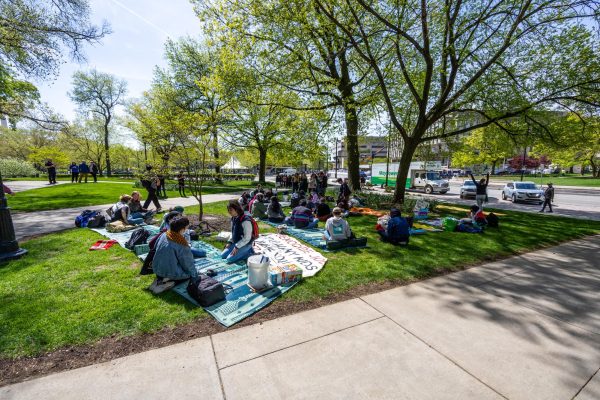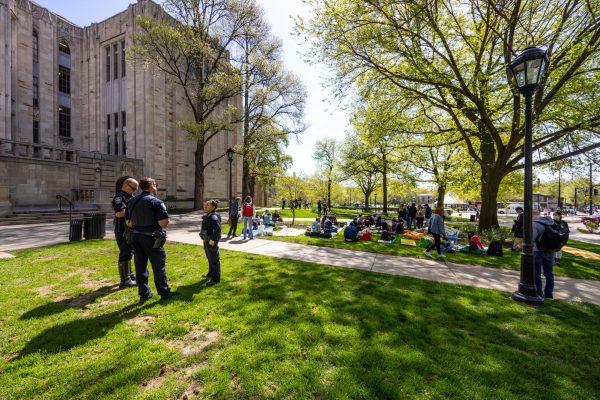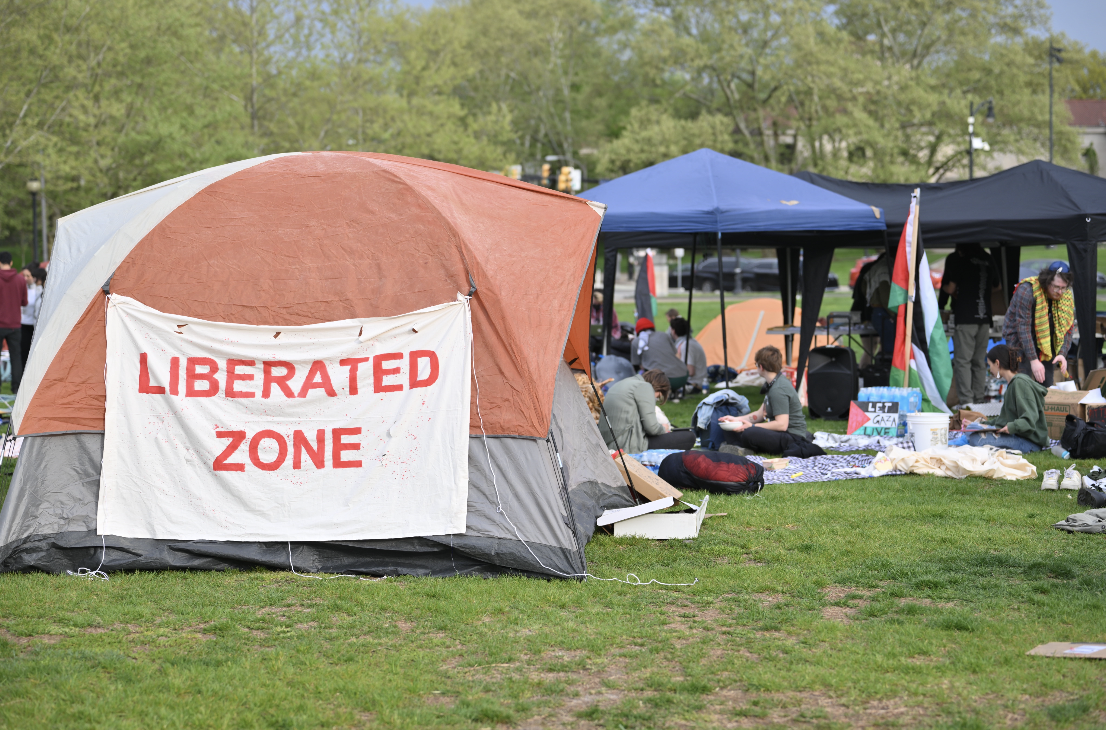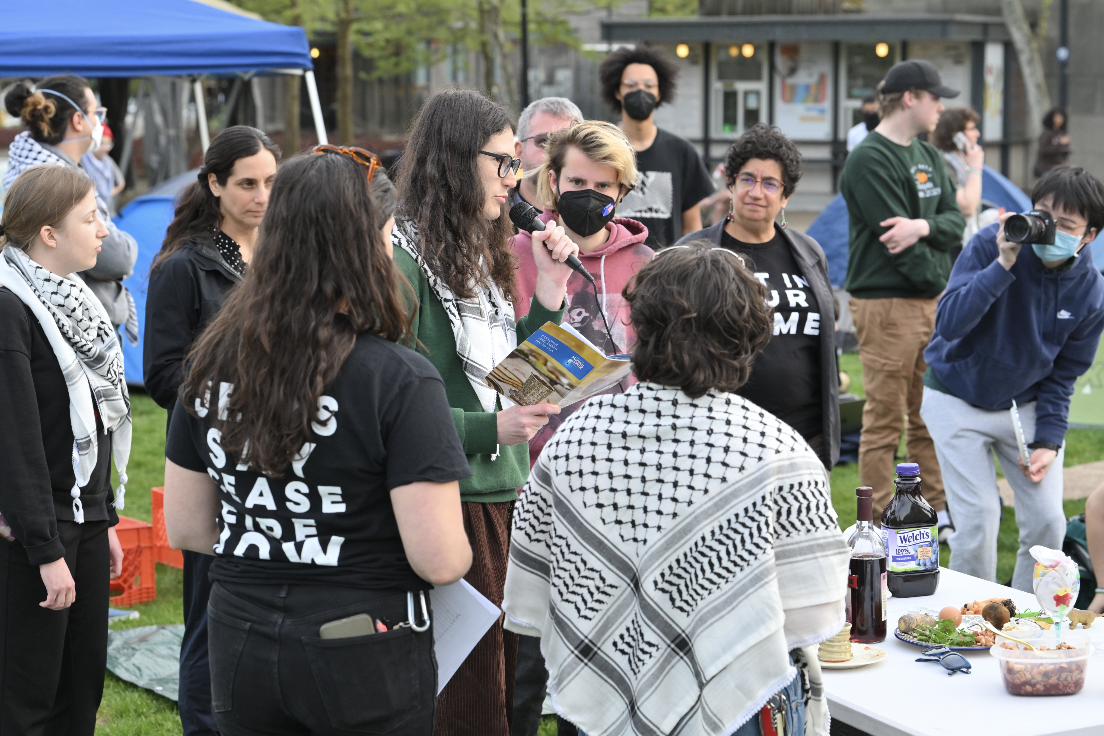Sit-in protests in support of Palestinians have spread to Pitt after similar demonstrations at Columbia and Yale.
“We’re gonna be here until the University forces us out or until they do what we’ve demanded of them,” Sam Weiner, a graduate student and organizer of the event, said.
A coalition of groups are staging a pro-Palestine “liberation zone” in front of the Cathedral of Learning from Tuesday morning through Friday. The protestors stayed on a grassy area near Bigelow Boulevard, before moving to Schenley Plaza, where they have spread banners and pro-Palestinian literature.
“[We’re] calling on the University to acknowledge their role and their position in apartheid and genocide and to divest financially … from military corporations, or anyone involved in the Israeli apartheid regime,” Weiner said.

Sarah, a Pitt student attending the event who wished to be referred to only by her first name, said Pitt should make clear its financial interests in Israel.
“Our primary goal is to get Pitt to understand our demands, which is to divest from Israel. Or at least be transparent with their financial statements about how they’re investing in Israel,” Sarah said.
The protest began inside the Cathedral but Pitt administrators told them to move outside. There, the organizers placed tarps, mats and blankets as well as a tent, though Pitt police quickly ordered the tent be taken down. Later in the afternoon, the group were asked to move to Schenley Plaza, where they started to set up tents to stay the night. Pittsburgh City police and Pitt police assisted in moving the students to Schenley Plaza but “no arrests were made,” according to University spokesperson Jared Stonesifer.
“[Students] have a lot more power than they think [they] do,” Sarah said. “It’s really important to one make a statement and show our university that we can’t continue to be complicit in a violent genocide and apartheid state.”
According to Sarah, holding the protest by the Cathedral makes people “uncomfortable” with their presence, and that’s the goal.
“A lot of students are going to be walking by Cathy,” Sarah said. “So I think by seeing this and making people slightly uncomfortable with our presence, it really will just have people be forced to think about what they’re supporting or what they’re neutral about.”
This protest follows larger demonstrations at colleges like Columbia, Yale, Harvard and Emerson, where students have camped out on quads and other university spaces. Police have arrested hundreds at these events but organizers at Pitt have not come into serious conflict with Pitt police.

“[The police officers] have just been standing around,” Weiner said. “The only ‘tension’ was some of us tried to move over to an [adjacent] lawn, which apparently is a reservable space. It’s been mostly nitpicky things that we’ve never seen cops bring up.”
Relations between the protesters, administration and police remained peaceful. However, Stonesifer noted that “the demonstration was not a registered event and was taking place in an area that is not designated as an event space.”
“The University of Pittsburgh affirms the rights of community members to engage in peaceful and orderly demonstrations,” Stonesifer said. “University of Pittsburgh administrators communicated with the demonstrators multiple times over the course of several hours and requested that they move to a different location. During those conversations, information regarding the demonstrators’ rights and responsibilities, including reminders regarding space reservation guidelines and expectations of student organizations, was shared with the demonstrators.”

Alitza Hochhauser, president of Chabad at Pitt, expressed concerns over the protest’s impact on Jewish students on campus as she looked onto the demonstration from in front of the Cathedral fountain.
“It’s incredibly disrespectful towards Jewish students during this time, especially during finals week,” Hochhauser said. “We have seen what is happening at Columbia. It is terrifying that many of my friends at home right now have to do classes from Zoom. To see this happening on Pitt’s campus is honestly terrifying.”
Weiner refuted these claims, saying that the protest is peaceful and nondisruptive.
“We’re not here to suppress any students or faculty or staff,” Weiner said. “What we’re here to do is to make a demand of our university administration that is supposed to take care of us. We never say anything about Jews. All we have ever talked about is the state of Israel and its political ideology.”
Weiner also noted that he is Jewish and that many other Jewish students are attending the protest.
“It’s important for us to show up, for lack of a better term, looking physically Jewish,” Weiner said. “At all these other campuses … they’re claiming that these movements are antisemitic or that Jews on campus are unsafe but we’re not the only Jews here. There’s a lot of anti-Zionist Jews all across the country that organize these events, and it really hurts when they use antisemitism as a shield.”
Hochhauser said Chabad supports the right of these groups to protest but that they “do not support the fact that they’re able to camp out here as a group of people for a prolonged period of time.”
Sarah is optimistic that the protest will make a strong impact at Pitt.
“If we all really organize together, we could really make more of a difference than we think,” Sarah said.
Day Two, April 24: Student protesters campmed overnight in Schenley Plaza. No arrests were made.
Day Three, April 25: Cornell West visits the Gaza liberation encampment in Schenley Plaza to speak to student protesters and community members.
Day Four, April 26: Joined by community activists, student protesters were approved to extend the encampment to Monday.



 : Alex Jurkuta
: Alex Jurkuta 